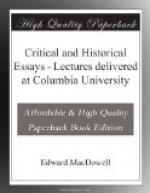Thus, at the beginning of our century we find two art forms: First, grand opera of a strange nationality, and second, the small but rapidly developing form of comedy or drama with music.
In order to show how Wagner evolved his art theories from this material, we must consider to some degree the general conditions of this period.
As late as 1853, Riehl wrote that Mendelssohn was the only composer who had the German public, whereas others had only a small section of it. For example, Schumann, whose music he did not like, was accepted as a new Messiah in the Elbe River district; “but who,” he asks, “knows anything about him in the south or west of Germany?” And as for Richard Wagner, who, he says, is a man of extravagant ideas and a kind of phenomenon of no consequence artistically, he asks, “who really knows anything about him outside of the little party of fanatics who profess to like his music (so-called)?” Its only chance of becoming known, he says, is in the public’s curiosity to hear works which are rarely given. This curiosity, he continues, will be a much more potent factor in his chance of becoming known than all his newspaper articles and the propaganda of his friend, Franz Liszt.
For the German opera there were half a dozen Boersenplaetze—Berlin for the northwest, Hamburg for the northeast, Frankfort for the southwest, Munich for the southeast. As Riehl says, a success in Frankfort meant a success in all the Frankfort clay deposit and sandstone systems, but in the chalk formation of Munich it stood no chance. Thus Germany had no musical centre. But after Meyerbeer found such a centre in Paris, all other Germans, including Wagner, looked to Paris for fame.
At the end of the eighteenth century, Vienna was the art centre; nevertheless Gluck had to go to Paris for recognition.
Mendelssohn only succeeded by his Salonfaehigkeit. Always respectable in his forms, no one else could have made music popular among the cultured classes as could Mendelssohn. This also had its danger; for if Mendelssohn had written an opera (the lack of which was so bewailed by the Philistines), it would have taken root all over Germany, and put Wagner back many years. At the death of Mendelssohn, the Philistines heralded the coming of a new German national school, founded on his principles (formalism), one that would clarify the artistic atmosphere of the turgid and anarchistic excesses of Wagner and Berlioz and their followers. These critics found already that Beethoven’s melodies were too long and his instrumentation too involved. They declared that the further music departed from its natural simplicity the more involved its utterance became, the less clear, and consequently the poorer it was. Music was compared to architecture, and thus the more Greek it was, the better; forgetting that architecture was tied to utilitarianism and poetry to word-symbols, and that painting is primarily an art of externals.




